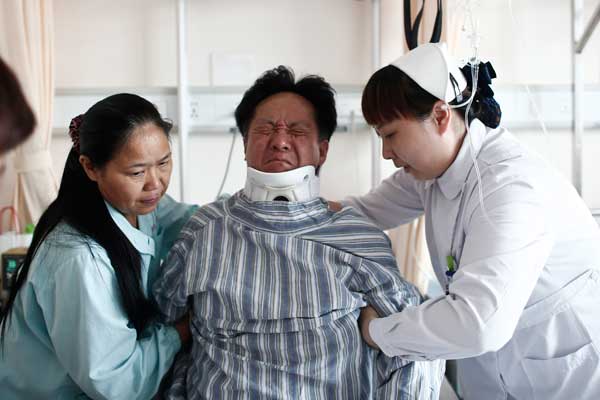

China needs legislation to stop parents leaving children home alone, a requirement made evident by the number of accidental deaths every year, legal and safety experts say.
Two accidents within hours of each other in Shanghai have again thrust child safety and parental care into the spotlight.
 |
|
Wang Jianzhong, who caught a boy who fell from a building’s fourth floor on July 1, thus saving his life, receives treatment at a hospital in Shanghai. Yang Yi / for China Daily? |
On June 30, two girls aged 5 and 7, fell to their deaths from the window of a 13th-floor apartment in the city's Pudong New Area. The next morning, a 5-year-old boy also fell four floors from an apartment in Baoshan district, but was saved by an onlooker who caught him in his arms.
In both cases the victims were children of migrant workers who had been left alone while their parents were at work.
"It was the first day of summer break and I left my son at home with the windows locked and the air conditioning on," said the father of the boy, who gave only his surname, Li. He is from Henan province.
Li and his wife were working at a wholesale fruit market at the time of the accident. "I didn't expect such a thing to happen," Li added.
At least nine incidents of children falling from buildings have been reported since June 20, with four lives lost. Eight incidents occurred while the child was left alone.
"There is a blank space in our law when it comes to childcare," said Yi Yi, who is in charge of marriage and family cases at Yingke Law Firm in Beijing.
According to Safe Kids Worldwide, a global nonprofit organization, nearly 50,000 children in China die in accidents every year. At least one in four of these deaths are caused by accidental injuries, and nearly 45 percent happen in the home.
"Not every child is lucky enough to have someone there to reach out their arms and rescue them," said Shen Hengde, who works with Zhong Hao Attorneys at Law in Beijing, referring to the incident in Baoshan district.
"We need more than just benevolence from the public. We need sound laws and systems," he added.
The Law on the Protection of Minors and the Marriage Law make no mention of how a child should be cared for. Although Civil Law does state that guardians are responsible for protecting the rights of youngsters, "there are no detailed guidelines, and it doesn't talk about punishments for violators", lawyer Yi said.
In the United States, most states ban parents from leaving children aged under 12 home alone.
"The laws (in some countries) emphasize the duty of parental care, and leaving a child who is too young to think logically alone is irresponsible," Yi added.
The number of latchkey kids is large due to many households having two working parents who are often faced with the dilemma of leaving a child alone for part of the day to meet work obligations, experts said.
"For migrant residents who have difficulty in asking grandparents for help in taking care of their kids when they're at work, government agencies should resort to social resources and shoulder the responsibility of providing care to ensure their safety," said Xi Xiaohua, director of Capital Normal University's Juvenile Legal Social Work Research Center.
A report by the Shanghai Municipal Statistics Bureau released on July 1 said there are about 5.6 million married migrant workers in the city, with an average of 1.5 children. Nearly 54 percent of their children are left behind in their hometowns.
"Most parents sweat their guts out for the sake of their kids," said Liu Jing, who hails from Changzhou in Jiangsu province and has a 4-year-old daughter. "All those efforts are in vain if they lose their child due to neglect of care."